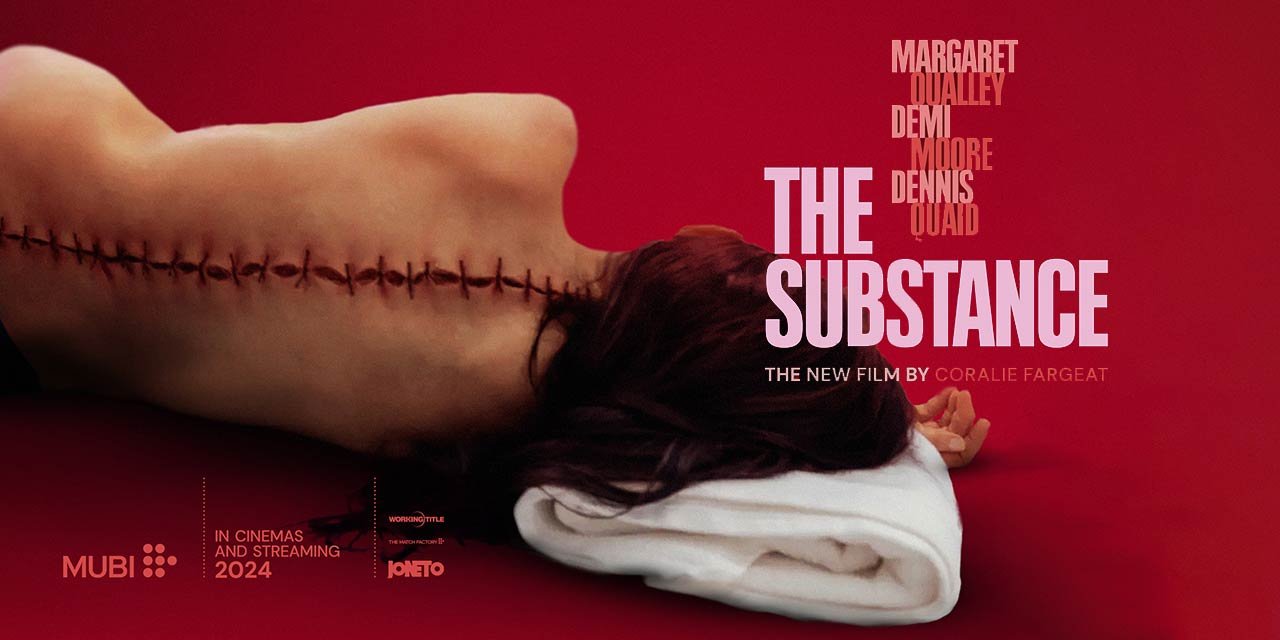
After losing her job on her 50th birthday as the television station seeks to find a younger replacement for their fitness channel, Elisabeth Sparkle turns to a black market drug known as 'The Substance' that uses cell replication to create a better, more youthfully vibrant version of the user. Directed by Coralie Fargeat in her sophomore feature, and starring Demi Moore, Margaret Qualley and Dennis Quaid, will you be tempted by all The Substance has to offer?
If you're after subtlety, it's nowhere to be found in Coralie Fargeat's The Substance - which is mostly to its credit. An audacious, bombastic and nastily satirical voyage into the impossibility of female beauty standards, self-sabotage and ambition, Fargeat has crafted a blistering cautionary tale that provides the body horror sub-genre with a new classic. Seeping with style, uncompromised in its disgusting vision, The Substance presents its proudly singular vision with a squelch.
Armed with a gnarly concept it gleefully explores with attention to detail and free range to execute it as ruthlessly as possible, The Substance certainly has plenty to say - even if the depth is not quite as rich as it could have been. With a tight control of tone, which utilises more comedy than expected but works in sharpening its satirical edge, but a rather sparse amount of dialogue, The Substance takes its timely concept and drives it, at breakneck speed, through a world crafted by a filmmaker completely uninhibited.
One of the benefits of penning your own screenplay is knowing you have the directorial tendencies to pull it off, with Fargeat's talent evident in film one (Revenge) and undeniable in film two. Crafting a meticulous environment, in which every detail is painstakingly thought out, from Raffertie's throbbing score, the rapid-fire editing and the disorientating high camera angles used to capture the somewhat artificial world - but one, importantly, not too dissimilar to our own. Borrowing stylistic influences from the body horrors of yesteryear provides the film with a classic cult feel while still ensuring her own personality is coursing through The Substance's veins, Fargeat vivid imagery, born as a result of the superb production and costume design, to say nothing of the extraordinary practical effects, are astounding, and entertain in a way best suited to a crowded cinema screening room.
In an ironic twist of fate, however, the biggest criticism that can be levelled at the film's climatic moment is that it elects style over substance. Instead of leaning into the immense sadness of the concept and messaging in a victory lap that would grant the film its cake and the ability to eat it too, The Substance goes hell-for-leather in a frenzied carnage of blood and gore that is neither as impressive nor as potent as what has come before. It feels, at best, needless, and, at worst, wasteful. To have the poignancy of 140 minutes just within reach but disregarded in favour of genre over message is a real shame, and prevents The Substance from registering as one of the year's very best films. Additionally, it spends too long driving messages home, spelling things out to mainstream audiences - cuts to text, obvious flashbacks and exhausting repetition - instead of trusting them to pick up the pieces themselves.
In a suitably and rewardingly transformative role, Demi Moore delivers a powerhouse performance that escalates in intensity, with all shades of the journey played superbly. The type of admirably brave and formidable performance with the ability to redefine an established career, Moore sinks her teeth into Elisabeth Sparkle and provides the film with a nuance the sheer bombardment of blood, gore and horror could have wiped out entirely. Her frustrations, jealousy and ultimate sadness are documented with sophistication, in an all too real and recognisable way that ensures that amongst the overwhelming sensory overload, the audience can connect with something real, something tangible - particularly in the social media age, where comparisons to others are so easy, Moore exposes the exploitation of our insecurities in such a thought-provoking, insightful way.
Margaret Qualley is delicious and delirious, a brashly confident and formidable performance that unravels to reveal the insecurities she was borne out of. Picture perfect in her design, Sue becomes an image of beauty, confidence and youth, with Qualley gently cracking the surface as the minutes go by to reveal the interior struggle, desperation and ambition to hold on to that. As with Moore, Qualley is committed, a no-holds-barred star turn demonstrating her aspiration as an artist to tackle trickier roles than her counterparts may be tempted by. Dennis Quaid also impresses in a supporting capacity, a purposely exaggerated performance that feeds into this unorthodox but not unfamiliar world.
Coralie Fargeat, for better or for worse, is not interested in subtly and as such The Substance goes hell-for-leather in her scathing yet sympathetic exploration of the sacrifices we make for unattainable perfection, how that's defined by a male-dominated system that wouldn't dream of bestowing the same values on to itself and how we often become our own worst enemies through our insecurities. A demented fairytale of sorts, whose garish visuals, committed performances and inspired premise are as endlessly entertaining as can be. If the film falls slightly shy of greatness by missing out on opportunities to deepen its themes and message, it's nevertheless thrillingly bold and inspired work by a filmmaker whose retooling of the sub-genre has resulted in one of its most exciting - and timely - efforts in years. Indulge in The Substance - if you have the stomach for it.